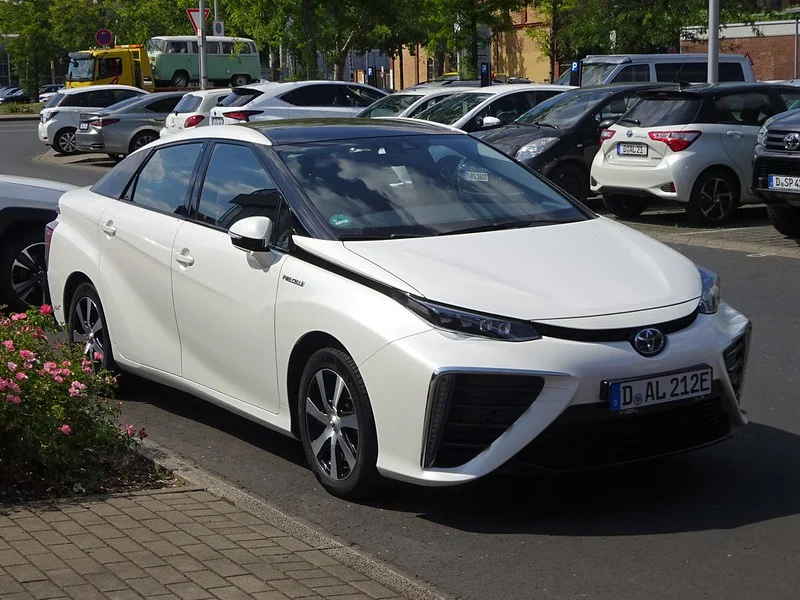How Long Do Toyota Mirais Last? The Scoop on Vehicle Lifespan

Source: Flickr
The Toyota Mirai, whose name aptly means “future” in Japanese, is a vehicle that not only drives on the road but has also driven innovation in the automotive industry. This hydrogen fuel cell car, or FCEV, is more than just a statement of eco-friendliness; it’s a glimpse into the future of sustainable transportation, courtesy of Toyota’s pioneering spirit.
As the market shifted its focus to cleaner, greener vehicles, the Mirai stands out with its promise of zero emissions and cutting-edge technology. So many of you are asking the burning question, “How long do the Toyota Mirais last?” is not just of interest to environmentally conscious buyers but also to anyone fascinated by the longevity of hydrogen cars.
In this post, we’ll delve into the lifespan of the Mirai, how many miles it can last, and whether it’s a good investment down the line. Let’s take a look.
How Many Miles Does the Toyota Mirai Last?
How long do the Toyota Mirais last? Like any other modern vehicle, the lifespan of the Toyota Mirai is typically measured in terms of years in service or miles driven. Although Toyota hasn’t provided an official maximum lifespan for the Mirai, it’s common for contemporary vehicles, especially from trusted manufacturers like Toyota, to be designed for longevity. In addition, the Mirai’s lack of popularity has made it trickier to find longevity feedback from real owners.
Typically, a well-maintained vehicle can last for over ten years or exceed 150,000 to 200,000 miles. However, the Mirai’s unique hydrogen fuel cell technology may influence its lifespan differently than traditional internal combustion engines or even standard electric vehicles.
FEEL SECURE IN THE CAR YOU CHOOSE
You don’t want to buy a car - you want to get the best deal on the car you’re looking for. The CoPilot app will notify you if there’s a similar vehicle in your area at a better price, so you’re always certain you got the best deal available.
According to Toyota’s website, the Japanese manufacturer ensures that the Mirai’s fuel cell stack endures its entire lifetime, following the same high standards of quality, durability, and reliability as its other vehicles. Moreover, Toyota provides a 100,000 km warranty to guarantee customer satisfaction. When the fuel cell stack reaches the end of its lifecycle, it can either be repurposed for other applications or disposed of responsibly via Toyota’s take-back program.
On the other hand, the lifespan of hydrogen cars, as detailed in the FCEV Factbooklet, is designed to match the lifetime of the vehicle itself. Specifically, the fuel cell stacks in hydrogen cars are engineered to last about 150,000 to 200,000 miles. At the end of their lifespan, these fuel cells are designed for the disassembly and recycling of their materials, similar to the process for other vehicle components.
With that said, this means that the Toyota Mirai is expected to have a lifespan of approximately 150,000 to 200,000 miles. This estimation is based on the durability of the fuel cell stacks and Toyota’s reputation for making reliable, long-lasting vehicles.
What Is Considered a Good Mileage for a Toyota Mirai?
When considering a used Toyota Mirai, a good mileage range to look for would be relatively low, ideally under 100,000 miles. This recommendation is based on a few considerations:
- Lifespan of Fuel Cell Stacks: As previously mentioned, the fuel cell stacks in vehicles like the Toyota Mirai are designed to last about 150,000 to 200,000 miles. Purchasing a Mirai with lower mileage means you will likely have a longer lifespan on these critical components.
- General Wear and Tear: Like any vehicle, the Mirai will experience wear and tear on various parts, such as the suspension, brakes, and interior components. Lower mileage often indicates less wear and tear.
- Battery and System Efficiency: Over time and with use, the efficiency of the battery and other systems in a hydrogen fuel cell vehicle can degrade. A lower mileage vehicle may retain more of its original efficiency.
- Warranty Considerations: Check if the vehicle is still under the manufacturer’s warranty, which can provide additional peace of mind. The warranty coverage might be based on mileage and time since the vehicle’s original purchase.
When considering purchasing a vehicle, it’s crucial to consider more than just the mileage. The condition of the car, its maintenance history, and any remaining manufacturer’s warranty are all important factors to consider. A well-maintained Mirai with a higher mileage may still be a good buy, especially if it has a comprehensive service record and is adequately cared for. Always have a qualified mechanic inspect a used vehicle to ensure it’s in good condition before purchasing it.
THE MOST RELIABLE YEAR FOR THE TOYOTA MIRAI
Originally showcased during the Los Angeles auto show in 2014, the Mirai quickly became one of the fastest-selling FCVs in the market, even into 2022. Nowadays, it’s a good idea to know which are the most reliable Toyota Mirai years.
How Do You Maintain a Toyota Mirai?
How long do the Toyota Mirais last? Well, like all vehicles, maintenance will be a crucial factor. Being an FHEV, the Mirai has different maintenance steps than your traditional gas-powered car. However, it’s also generally more straightforward. According to the FCEV Factbooklet, the maintenance requirements for a fuel cell car like the Mirai include:
- Brakes: Regular inspection and maintenance of the braking system are necessary, as with any vehicle.
- Air Filters: Replacement of air filters is required to ensure efficient operation of the fuel cell system.
- Coolant: Periodically check and top off the coolant to maintain optimal temperature regulation in the fuel cell system.
Notably, fuel cell vehicles have fewer moving parts than traditional cars, reducing overall maintenance needs. For instance, in a Mirai, you won’t need to:
- Change the oil, as there is no conventional internal combustion engine.
- Conduct smog tests since FCVs produce zero tailpipe emissions.
- Replace belts or spark plugs, as these are not fuel cell system components.
Additionally, automakers often provide no-cost scheduled maintenance for a certain period, typically around three years. This maintenance includes key fuel cell components such as the fuel cell stack and compressor.
Overall, the Toyota Mirai and other FCVs have fewer maintenance requirements than traditional gasoline or diesel vehicles. These maintenance aspects are explained in the fact booklet. However, checking the vehicle’s owner’s manual for detailed maintenance guidelines and schedules is recommended.
AI-ASSISTED CAR SHOPPING
Never miss out on the best car, never overpay, and never get taken advantage of. Download the CoPilot app to see the magic of AI-assisted car shopping.
Final Thoughts: Is a Used Toyota Mirai a Wise Investment?
As you can see, a used Toyota Mirai can be a worthy investment in the long run, especially with regard to longevity. However, one main thing to consider is the availability of hydrogen refueling stations.
Get a Curated List of the Best Used Cars Near You
The CoPilot car shopping app is the easiest way to buy a car. Tell us what you’re looking for and we’ll search the inventories of every dealership in your area to make you a personalized list of the best car listings in your area.
Only looking for newer models? CoPilot Compare is the search engine for nearly-new cars. Only see cars five years or newer with low mileage — CoPilot Compare is the best way to find off-lease, early trade-in, and CPO cars.
The best part? CoPilot is built using the same technology that dealerships use to buy and sell their inventories, so we have more info on each vehicle than competitors. CoPilot doesn’t work with dealerships, so there are no sponsored posts or other shady practices — just the most info on the best cars. Check out our About Us page to see how CoPilot works.








